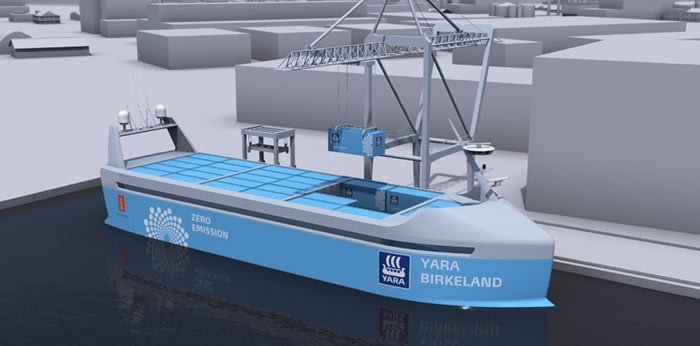Norwegian government chips in $17m to help build world’s first autonomous boxship

The Norwegian government enterprise Enova has decided to grant NOK133.6m ($16.83m) to Yara to build the world’s first electric and autonomous containership.
“For the private sector, it is essential to have the government’s support when we develop new technology and deliver bold innovations. It allows us to be daring and explore the unknown. The making of Yara Birkeland is an excellent example of a public-private partnership in practice,” commented Svein Tore Holsether, Yara’s CEO.
Enova is a Norwegian government enterprise responsible for promoting environmentally friendly production and consumption of energy. Its stated purpose is to explore new sources of clean energy, reduce overall energy consumption and to provide educational materials to the public promoting energy-efficient practices. Established in 2001, it is financed through government funding. The company is owned by the Norwegian Ministry of Petroleum and Energy and based in Trondheim.
In May, Yara announced a collaboration with the technology company Kongsberg to build the world’s first autonomous and zero emission container ship. The vessel, which will be named after Yaras’s founder, Kristian Birkeland, will transport fertilizer from Yara’s production plant in Porsgrunn to the container ports in Brevik and Larvik. By moving this transport from road to sea, Yara will remove 40,000 journeys with diesel-powered truck transport every year.
“The interest in autonomous transport is great, but at the same time many are skeptical and question the safety. The key contribution from this project is to demonstrate that autonomous and electric sea transport is feasible, and will deliver the results we want, “said Nils Kristian Nakstad, CEO of Enova.
The plan is to launch Yara Birkeland in the first quarter of 2019.

… what environmental advantage is there, if after a blackout on board the vessel technical help comes too late and fertilizer is spoiled in the water and along the coastline. On the road anyone passing by could help by informing what happened and cleaning up is rather easy… at a rocky coastline nothing is easy… furthermore environmentally friendly and autonomous has nothing to do with each other…
To grow we need to do experiment and there is no doubt it will be a success.
Although I readily admit to NOT being a particularly enthusiastic supporter and/or fan of the relentless & ongoing march of technology into our daily lives … this particular story seems to be quite realistic in objectives that are being sought after and I suspect that we will see a steady move toward such autonomous realities in many aspects of life as we used to know it.